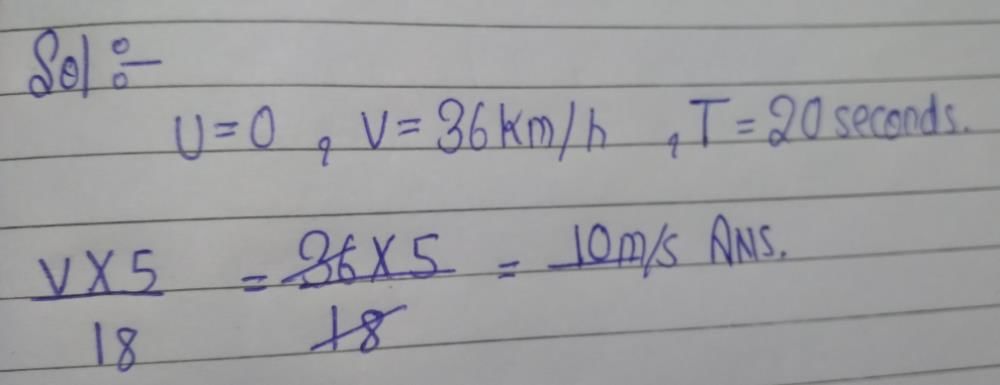Verbal Exam > Verbal Questions > Car accelerates from rest to a speed of 36 km...
Start Learning for Free
Car accelerates from rest to a speed of 36 km/h in 20 seconds. What is the acceleration of the car in m/s 2 ?
Most Upvoted Answer
Car accelerates from rest to a speed of 36 km/h in 20 seconds. What is...
Calculation of Acceleration of a Car
Given, initial velocity (u) = 0 km/h
Final velocity (v) = 36 km/h
Time taken (t) = 20 seconds
Converting units from km/h to m/s
In order to calculate acceleration, we need to convert the units of velocity from km/h to m/s because acceleration is measured in m/s2. We know that 1 km/h = 0.2778 m/s. Therefore,
Initial velocity (u) = 0 km/h x 0.2778 = 0 m/s
Final velocity (v) = 36 km/h x 0.2778 = 10 m/s
Calculating Acceleration
We know that acceleration (a) can be calculated using the formula:
a = (v - u) / t
Substituting the values we get,
a = (10 m/s - 0 m/s) / 20 s
a = 0.5 m/s2
Explanation
Acceleration is the rate at which an object changes its velocity. In this case, the car starts from rest and reaches a velocity of 36 km/h in 20 seconds. We have converted the units to m/s and used the formula a = (v - u) / t to calculate the acceleration of the car. The acceleration is 0.5 m/s2, which means that the car is increasing its velocity by 0.5 m/s every second.
It is important to note that acceleration can be either positive or negative. A positive acceleration means that the velocity of the object is increasing, while a negative acceleration means that the velocity is decreasing. In this case, the acceleration is positive because the velocity of the car is increasing from rest to 36 km/h.
Community Answer
Car accelerates from rest to a speed of 36 km/h in 20 seconds. What is...


|
Explore Courses for Verbal exam
|

|
Similar Verbal Doubts
Car accelerates from rest to a speed of 36 km/h in 20 seconds. What is the acceleration of the car in m/s 2 ?
Question Description
Car accelerates from rest to a speed of 36 km/h in 20 seconds. What is the acceleration of the car in m/s 2 ? for Verbal 2024 is part of Verbal preparation. The Question and answers have been prepared according to the Verbal exam syllabus. Information about Car accelerates from rest to a speed of 36 km/h in 20 seconds. What is the acceleration of the car in m/s 2 ? covers all topics & solutions for Verbal 2024 Exam. Find important definitions, questions, meanings, examples, exercises and tests below for Car accelerates from rest to a speed of 36 km/h in 20 seconds. What is the acceleration of the car in m/s 2 ?.
Car accelerates from rest to a speed of 36 km/h in 20 seconds. What is the acceleration of the car in m/s 2 ? for Verbal 2024 is part of Verbal preparation. The Question and answers have been prepared according to the Verbal exam syllabus. Information about Car accelerates from rest to a speed of 36 km/h in 20 seconds. What is the acceleration of the car in m/s 2 ? covers all topics & solutions for Verbal 2024 Exam. Find important definitions, questions, meanings, examples, exercises and tests below for Car accelerates from rest to a speed of 36 km/h in 20 seconds. What is the acceleration of the car in m/s 2 ?.
Solutions for Car accelerates from rest to a speed of 36 km/h in 20 seconds. What is the acceleration of the car in m/s 2 ? in English & in Hindi are available as part of our courses for Verbal.
Download more important topics, notes, lectures and mock test series for Verbal Exam by signing up for free.
Here you can find the meaning of Car accelerates from rest to a speed of 36 km/h in 20 seconds. What is the acceleration of the car in m/s 2 ? defined & explained in the simplest way possible. Besides giving the explanation of
Car accelerates from rest to a speed of 36 km/h in 20 seconds. What is the acceleration of the car in m/s 2 ?, a detailed solution for Car accelerates from rest to a speed of 36 km/h in 20 seconds. What is the acceleration of the car in m/s 2 ? has been provided alongside types of Car accelerates from rest to a speed of 36 km/h in 20 seconds. What is the acceleration of the car in m/s 2 ? theory, EduRev gives you an
ample number of questions to practice Car accelerates from rest to a speed of 36 km/h in 20 seconds. What is the acceleration of the car in m/s 2 ? tests, examples and also practice Verbal tests.

|
Explore Courses for Verbal exam
|

|
Signup for Free!
Signup to see your scores go up within 7 days! Learn & Practice with 1000+ FREE Notes, Videos & Tests.



















